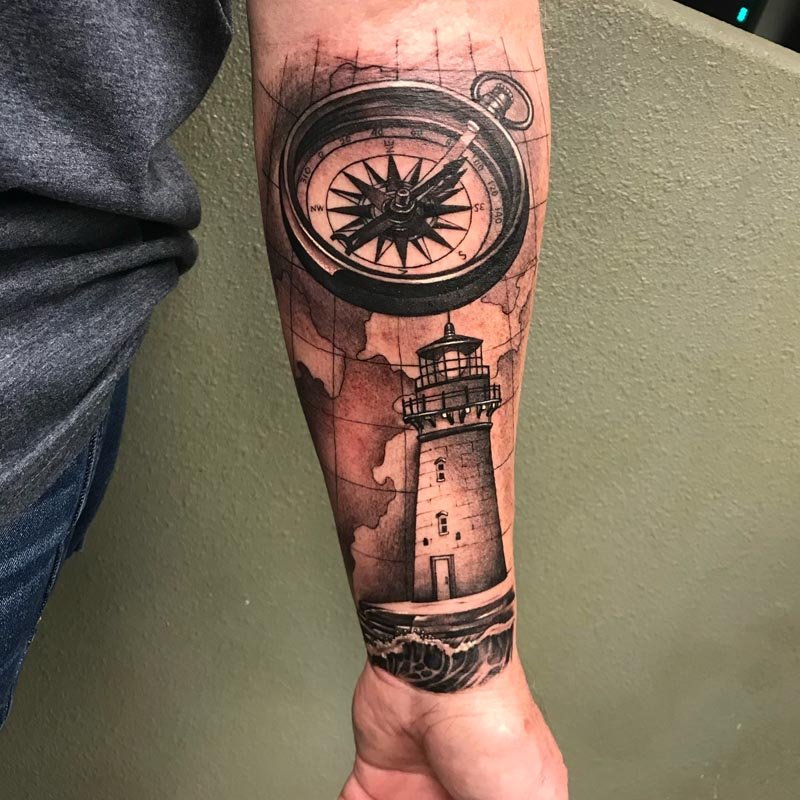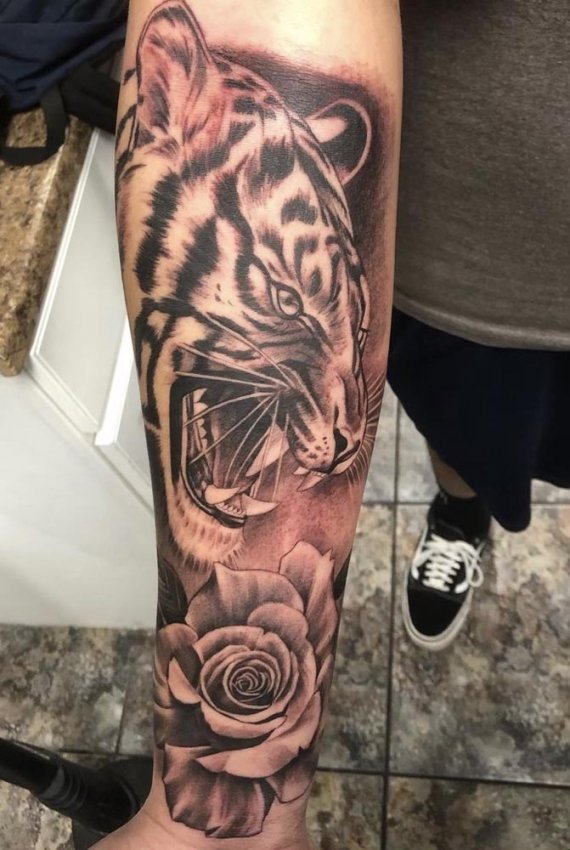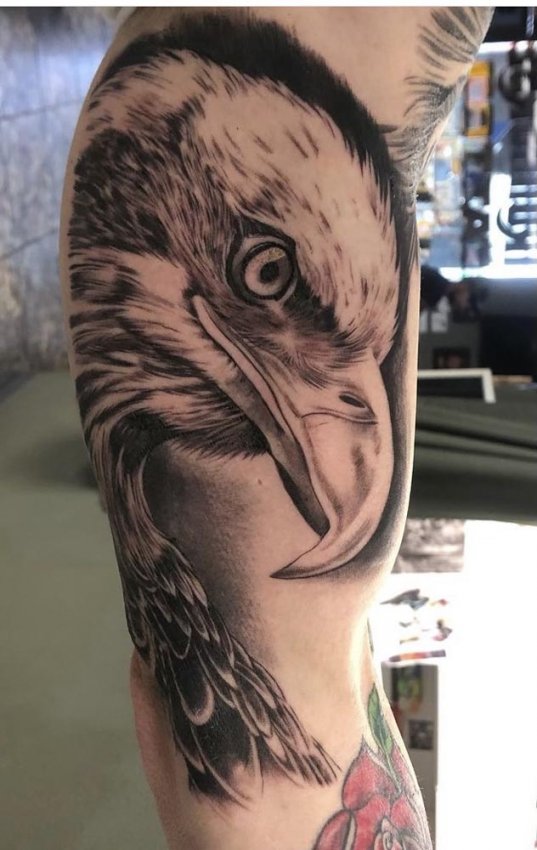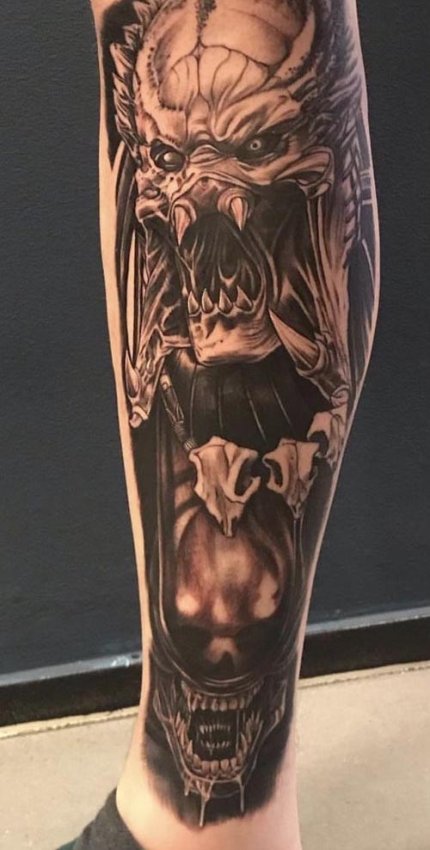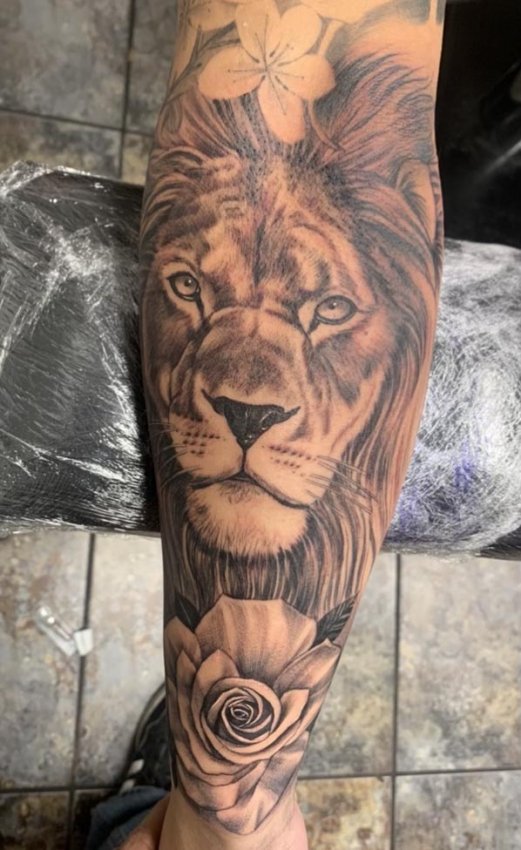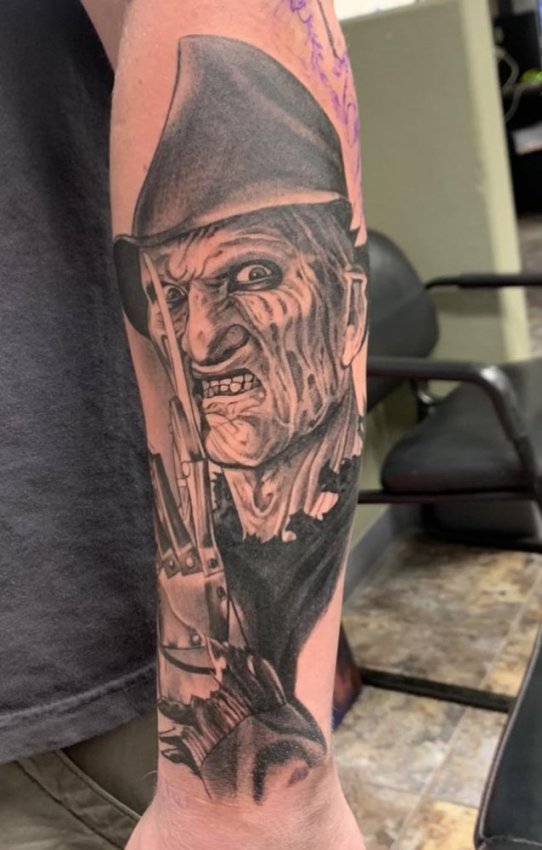From his earliest childhood days, Yuba One loved art. You could catch him with his eyes glued to Bob Ross on PBS. But there was another side of art that was just as much a part of Yuba’s life growing up in the rougher parts of Los Angeles, and that was graffiti.
In the neighborhood where I grew up, graffiti was a big part of our life. So it was interesting to analyze and dissect the difference between the art I saw on TV from Bob Ross and the art on the streets. Although the two styles of art were on opposite ends of the spectrum, they both made a big impression on me. Even now they define a lot of my style, my linework, and even the mediums that I use.
But Graffiti was the catalyst that launched Yuba’s career as a tattoo artist.
I have to attribute graffiti to where I am today. There’s a lot of negativity associated with graffiti and the lifestyle surrounding it, but I think the trials and errors—all those things I experienced growing up in the neighborhood—helped shape me into who I am today.
There was a steady progression. But I think it’s safe to say, there's a pretty linear path from graffiti to tattooing. So, I'm grateful for graffiti because it led me to where I am now.
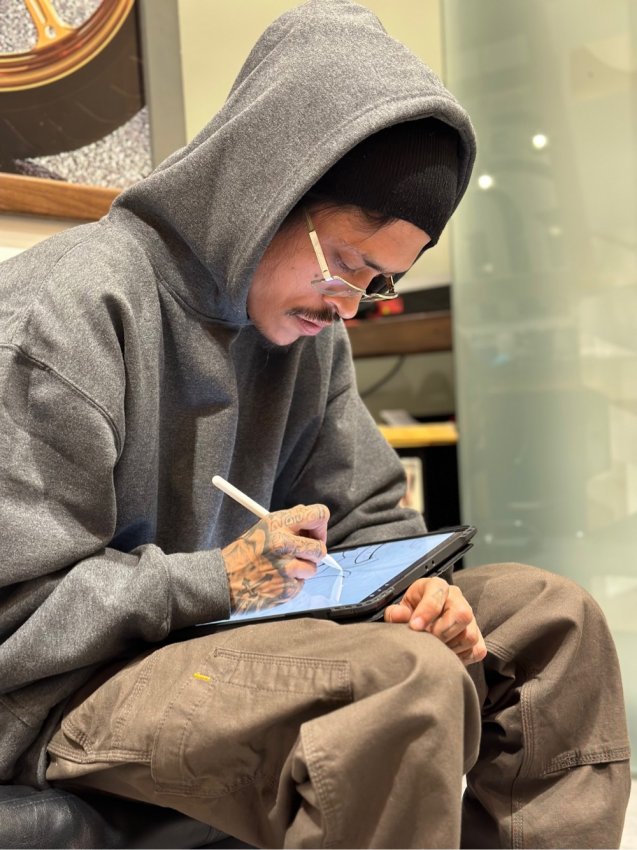
Where he is now, Hart & Huntington Las Vegas, and who he is now, an incredible tattoo artist was all part of Yuba’s journey—a journey that could have had a very different ending.
I’m lucky to have fallen into tattooing. I’m grateful that my friends and everybody around me encouraged me to follow this path as opposed to the other path. I had to decide if I was going to use art to build something better or if it was going to take me down the path of destruction.
Yuba took the path less traveled in that Los Angeles neighborhood, and although it was a gradual progression, he turned his passion into a profession.
I grew up surrounded by gangs. A lot of my homies were looking for an artist to work on them and everybody in the neighborhood and circuit knew that I was good with graffiti, so they just kind of pushed me to tattoo them. They needed an artist. And I just remember thinking, ‘I can do that, I just gotta learn how to draw.’ And, then I needed to learn how to use the tools.
There was no formal “School for Tattooing” for For Yuba. It was more like baptism through fire.
I picked up on tattooing by watching my cousins tattoo each other, and I just realized that wasn't the way to go. If I really wanted to learn this, I had to apply myself and learn how to tattoo the right way.
So Yuba did what any person wanting to learn the art of tattooing would do, grab his collection of art and hit the pavement.
I had a stack of my graffiti books, maybe like three of them, and they were full. I just started going to tattoo shops and asking for an apprenticeship. I was lucky that one of the shops saw my book and were excited to work with me. They knew I was rough around the edges but they saw the potential in me. So luckily they gave me a chance, they were patient, and they stuck with me.
During his apprenticeship, Yuba found himself surrounded by a group of like-minded people with the same ambitions.
For many of the artists, tattooing was more than a paycheck, it was a drive to create great pieces of art. Nice things, you know. Nice tattoos. Nice paintings. There was a lot of enthusiasm. Everybody is working towards a goal. The end game may have been different for everyone but the motivation behind it was the same. Create great art.
As much as Yuba found the apprenticeship rewarding, balancing a full time job, learning his new skill, dealing with Los Angeles traffic and paying rent wasn’t easy. He hustled to become an artist while supporting himself. But the grind wasn’t for everyone and Yuba saw that first hand.
I would say that the tattoo industry is tough. I saw a lot of people give it up—people with a lot of talent and that really surprised me. So many people I started with no longer tattoo. But it opened my eyes and I realized that no matter how hard it gets, you can’t give up. You have to keep on going. I think that's the only way to make it in the tattoo world.
I know I thought it would be easier than it was, but I couldn’t let that stop me.
Realizing that he had to work hard to get to where he wanted in the tattoo industry, Yuba devoted everything he had to his craft. But once his apprenticeship was over, he decided to merge his new skills with life experiences. And, for the kid who didn’t venture much outside his LA neighborhood, that meant traveling to different parts of the world—and it’s what shaped Yuba into the incredible artist he is today.
When my apprenticeship was over, I decided to leave Los Angeles. I wanted to see other parts of the world, meet different people and learn their techniques. I grew up learning Black and Gray, which is pretty symbolic of Los Angeles. So I wanted to step away from what I knew and see other styles, hear what other people had to say about tattooing and what they thought about different things. So I used traveling as a means to do that. I wanted to get as far as I could from where I learned my skills and where I started, so I could really get the most out of my experience. I worked with the same people in the same shop for so long, I wanted to see how the rest of the world did things. And, it was a great experience. I met a lot of really cool people who taught me a lot of great things that I still apply to my tattoos to this day.
It was during his travels that Yuba created some of his most memorable tattoos.
One tattoo in particular stands out to me. I was tattooing in Amsterdam two years back. There's a huge language barrier because a lot of people speak Dutch. So I had to have a translator. An older woman, in her late 70’s, came in to get a tattoo with some writing on her chest. There were some tiny little flowers which I wasn’t used to coming from mostly doing large scale Black and Gray, but it ended up being one of the tattoos that made a big impression on me. So I did the tattoo but didn’t know what the writing said because it was in Dutch. She asked the translator if I knew what it said, which I didn’t. He told me it read ‘Do Not Resuscitate.’ He then shared her story. The woman’s husband passed away about 10 years ago. She technically passed away twice since then but they kept resuscitating her and she didn’t want them to do that again. If she passed, she wanted to be with her husband. She said that she had been so alone for so long that she was ready. She didn’t want to be without her husband anymore—hence ‘Do Not Resuscitate.’
This memory is still etched in Yuba’s mind and by her reaction, he knew he made a difference in her life.
I remember she started crying at the end because finally, she got what she wanted.
You never really understand what people are going through until you put yourself in their shoes.
I was just glad I could help her. It taught me not to make assumptions, because you just don’t know.
Yuba made his way back to the states, and it wasn’t long after that Hart & Huntington started knocking on his door.
Hart & Huntington reached out to me about a year and a half ago. I wasn’t really looking for another job or anything. But yet, when I started thinking about it I guess I didn’t feel too fulfilled where I was. So after a few months of sitting on the offer, eventually I just realized that I wasn't motivated where I was, so I made the move.
Making the move to Hart & Hunting was just what Yuba needed to take his career to the next level. As far as progression goes, the move to H&H seemed to be an organic part of the process.
At Hart & Huntington, everyone’s on their toes. Everyone is grinding. Everyone is producing amazing works. So, I felt like it was time to progress in my work as well—go somewhere where the tattoos are a little higher level and people take things a little more seriously. They’re more motivated. And it’s been great, man. Everyone’s amazing. Everyone’s awesome. I’m really happy. But, there was a definite progression, even though it may have been slow.

As the cliche goes, it’s progress not perfection, especially when it comes to something as subjective as art. But, Yuba is taking it in stride, continuing to expand his skills, incorporate new techniques, and leverage the opportunities for growth that are unfolding.
People get very stuck in their techniques, very stuck in their ways and their style, so being surrounded by so many different styles and methods of doing things, keeps me on my toes. It gives me a chance to improve in areas I didn’t even know I was lacking. Everybody adds different flavors to the mix. It's nice to feel like there's a lot of room to grow.
As much as Yuba has grown both as an artist and as a person, he stays true to his roots and where he came from. In fact, everyday he sees a reminder of where he started when he looks in the mirror.
The most special tattoo I have is on my chest. It’s one that my brother did. He’s a phenomenal tattoo artist. He’s absolutely amazing at what he does. But, when I look at the tattoo he gave me on my chest, I remember that day so clearly. We were just kids. We got a tattoo machine on Amazon and we were trying to figure out what we were doing—trying to just mess around, not knowing where it would lead us. So now every morning when I look in the mirror, I remember those days when we had no idea what we were doing in our garage. That's what inspires me every morning. I remember where it all started.
If you’re looking for an extraordinary Black and Gray tattoo, fine line, Neotraditional, New School or anything that resembles graffiti style, you’d be hard pressed to find an artist more adept than Yuba. These styles are intrinsic to who he is. But even though he is a remarkably talented tattoo artist, he’ll humbly tell you that being a great artist isn’t what defines him—being a good person does. And, that’s what he wants his clients to remember when they walk out of the shop.
I would rather be remembered as a good person. I want to do good things for good people. I hope that people appreciate my art, but I’d rather them remember my kindness. Being a good artist is just a bonus.
